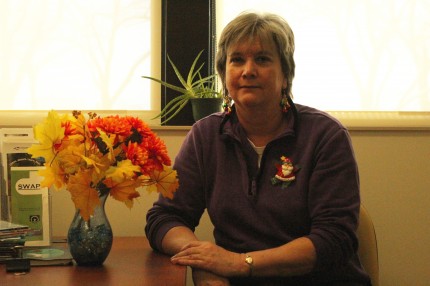Features Reporter
Photos by Brian Wise
Nancy Conklin sits down next to a student in an English 111 class. She pulls out a laptop, hands it to the student next to her and then pulls out another for herself.
“Class, today we will be talking about your essays on the book we read last week,” the professor says.
Conklin types a shorthand version, which is interpreted by the laptop and sent in full words to the student sitting next to her.
The student sitting next to Conklin is deaf. Conklin, who works in CMU’s Educational Access Services, provides assistance. Conklin is the coordinator of EAS, but she also works directly with students who have documented disabilities.
“We work with students with all different types of disabilities,” Conklin said. “Some students need extra time on tests. Some students need a computer to write out their answers, and some need their tests read aloud to them. We also do audio books, braille, sign language [and] priority registration.”
Another student comes into the EAS office to take a test. He sits in one of the testing rooms away from the other students because he cannot handle the distractions of a classroom. It could be anything from someone clicking a pen, a student leaving the room or even an instructor walking around the room.
The testing room is dimly lit and set far away from the hallways of Houston Hall. The only noise comes from the scratch of pen and paper.
“For students to use our services, they need to contact our office directly and set up an appointment with me. They need to bring documentation if they have it,” Conklin said.
Students who do not have documentation are still encouraged to set up an appointment.
“It’s amazing what we have. I’d say that half of the males that work here are vets,” student worker James Ahmed said. “We have an absolute blind person that works here. He proofreads all the stuff we do. It creates perspective on what we think is blind[ness] compared to what is blind[ness].”
According to Conklin, some veterans have PTSD and hearing loss, which can hinder learning. The EAS program is currently seeking to help veterans, but the staff is having a hard time reaching out to them. Many of the veterans feel as though using the EAS services is a conflict with pride.
In the back of the EAS office sits a room dedicated to producing alternative materials for students to learn by. One portion of the room contains a computer where Ahmed, in addition to other student workers, converts the textbooks students need for class into audiobooks. Another part of the room is filled with different materials used to make braille texts. A large printer, which only prints in braille instead of ink, sits in one corner.
Many professors include sections about the EAS office in their syllabi, but they often only gloss over it during the first day of class. Outside the office, many students shuffle by, never giving Educational Access Services a second glance. Inside the office is another story: one of success and achievement.
jkirk@mavs.coloradomesa.edu

Recent Comments